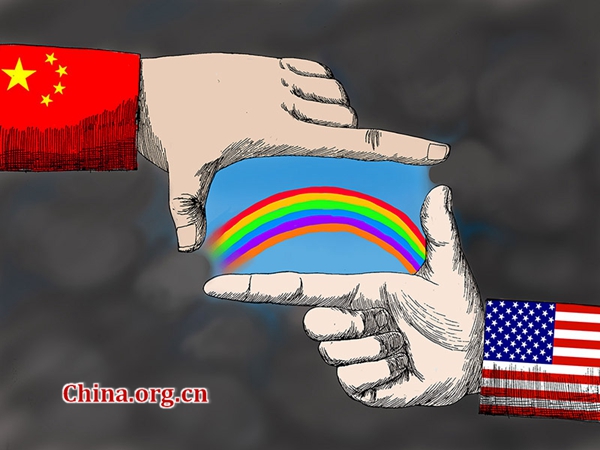Trump: encouraging signs, confusing inconsistency
- By Kyle Calandra
 0 Comment(s)
0 Comment(s) Print
Print E-mail China.org.cn, April 30, 2017
E-mail China.org.cn, April 30, 2017
|
|
|
Considering recent Sino-American trade agreements, and what's at stake regarding the North Korean nuclear threat, it remains unclear what ramifications Trump's probe will have on either outcome. [Zhang Xueshi/China.org.cn] |
Trump's apparent reversal has led journalists and policymakers to consider the president's retreat as a major shift in his overall China policy. Yet, he is claiming he hasn't softened his stance at all.
In an interview with "Fox & Friends host" Ainsley Earhardt, aired last week, the President asserted: "Nobody's ever seen such a positive response on our behalf from China, and then the fake media goes 'Donald Trump has changed his stance on China.' I haven't changed my stance. China's trying to help us."
Off the back of these comments, Reuters reported he launched an investigation last Thursday against exporters of cheap steel to the U.S., directly targeting China.
According to Reuters: "Trump ordered a probe under Section 232 of the Trade Expansion Act of 1962, which lets the president impose restrictions on imports for reasons of national security."
Taken either as a move to inspire his constituents who are desperate for a return to the glory days of the domestic manufacturing industry, or as a concentrated effort to convince the international community and China that he, indeed, hasn't changed his stance, the timing of the probe is unusual to say the least.
As the president himself admits, he is currently pressuring China to help him rein in "an increasingly belligerent North Korea." Considering recent Sino-American trade agreements, and what's at stake regarding the North Korean nuclear threat, it remains unclear what ramifications Trump's probe will have on either outcome.
Without being certain what Trump either expects or assumes will happen, the one area where China might be able to assert similar pressure is on climate change.
In an article for The Daily Caller, Michael Bastasch writes: "China and several other countries are badgering the Trump administration for answers on how it plans to fulfill former President Barack Obama's pledge to cut emissions as part of the Paris climate agreement."
After Trump rescinded emissions regulations on power plants and other directives, China submitted questions on the issue to the United Nations, the chief ones being:
"Given that President Trump is not supportive of President Obama's Climate Actions plan, it is even more challenging to achieve the 17 percent emission reduction in 2020 purely through domestic actions. Does the U.S. have any plan or preliminary thoughts on using international market mechanism to accommodate recent changes? If not, what additional measure will the U.S. consider to take to achieve the 2020 target?"
An offshoot of Trump's stance on climate change, and the direction he looks to be leading the United States, China has embraced a position of leadership and increasing influence on the global stage when it comes to the contentious climate issue.
This is unlikely to turn the tide of American opinion when it comes to perceptions of China, and, anyway, the two topics are arguably unrelated. However, this is an area where China is building a position of increasing prestige. Demanding answers from the Trump administration, which has espoused decidedly unpopular policies, could prove a clever tactic.
Shifting the focus from an unflattering accusation of unfair trade practices on the part of China to a discussion of climate change where Trump is an unpopular figure seems "Trumpian" in practice and scope.
Moreover, Trump is a self-confessed admirer of strength and authority. Responding in kind to his probe could send a strong signal that China is willing to operate on his level without actually sinking to it.
Overall, the first tests for the new era of Sino-U.S. relations have produced signs of encouragement as well as confusing inconsistencies.
Despite Trump's unusually-timed steel probe, which threatens to overshadow recent trade agreements while ultimately doing little to help his goal of bringing steel jobs back to America, a potential trade war between the two countries is becoming increasingly unlikely.
Meanwhile, the situation surrounding the North Korea nuclear threat is looking much improved in terms of bilateral understanding and cooperation, in spite of Trump's strange and provocative comments regarding Korea, which he recently claimed, "used to be part of China."
With these encouraging signs, there is also the cordial relationship and burgeoning goodwill between Trump and Chinese President Xi Jinping. Nevertheless, still greater tests lie ahead for Sino-U.S. relations.
Hopefully, overcoming the struggle to interpret Trump's demeanor and navigate the potential fallout from his alarming ignorance and diplomatic inexperience will remain the only serious difficulty.
Having previously lived in Beijing working as a journalist and editor, Kyle Calandra is currently based in America reporting on Sino-U.S. Relations as a contributor for China.org.cn.
Opinion articles reflect the views of their authors only, not necessarily those of China.org.cn.







Go to Forum >>0 Comment(s)